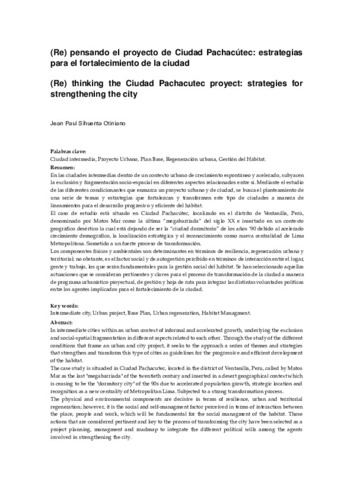Mostra el registre d'ítem simple
(Re) pensando el proyecto de Ciudad Pachacútec: estrategias para el fortalecimiento de la ciudad
| dc.contributor.author | Sihuenta Otiniano, Jean Paul |
| dc.coverage.spatial | east=-77.1493649482727; north=-11.84007179125412; name=Ciudad Pachacutec, Ventanilla, Perú |
| dc.date.accessioned | 2020-09-09T10:43:38Z |
| dc.date.available | 2020-09-27T00:31:37Z |
| dc.date.issued | 2020-09-28 |
| dc.identifier.citation | Sihuenta Otiniano, J.P. (Re) pensando el proyecto de Ciudad Pachacútec: estrategias para el fortalecimiento de la ciudad. A: Llop, C.; Cervera, M.; Peremiquel, F. (eds.). "IV Congreso ISUF-H: Metrópolis en recomposición: prospectivas proyectuales en el Siglo XXI: Forma urbis y territorios metropolitanos, Barcelona, 28-30 Septiembre 2020". Barcelonai: DUOT, UPC, 2020, p. 1-15. ISBN 978-84-9880-841-4. |
| dc.identifier.isbn | 978-84-9880-841-4 |
| dc.identifier.uri | http://hdl.handle.net/2117/328594 |
| dc.description.abstract | En las ciudades intermedias dentro de un contexto urbano de crecimiento espontáneo y acelerado, subyacen la exclusión y fragmentación socio-espacial en diferentes aspectos relacionados entre sí. Mediante el estudio de las diferentes condicionantes que enmarca un proyecto urbano y de ciudad, se busca el planteamiento de una serie de temas y estrategias que fortalezcan y transformen este tipo de ciudades a manera de lineamientos para el desarrollo progresivo y eficiente del hábitat. El caso de estudio está situado en Ciudad Pachacútec, localizado en el distrito de Ventanilla, Perú, denominado por Matos Mar como la última “megabarriada” del siglo XX e insertado en un contexto geográfico desértico la cual está dejando de ser la “ciudad dormitorio” de los años ‘90 debido al acelerado crecimiento demográfico, la localización estratégica y el reconocimiento como nueva centralidad de Lima Metropolitana. Sometido a un fuerte proceso de transformación. Los componentes físicos y ambientales son determinantes en términos de resiliencia, regeneración urbana y territorial; no obstante, es el factor social y de autogestión percibido en términos de interacción entre el lugar, gente y trabajo, los que serán fundamentales para la gestión social del hábitat. Se han seleccionado aquellas actuaciones que se consideran pertinentes y claves para el proceso de transformación de la ciudad a manera de programa urbanístico proyectual, de gestión y hoja de ruta para integrar las distintas voluntades políticas entre los agentes implicados para el fortalecimiento de la ciudad. |
| dc.description.abstract | In intermediate cities within an urban context of informal and accelerated growth, underlying the exclusion and social-spatial fragmentation in different aspects related to each other. Through the study of the different conditions that frame an urban and city project, it seeks to the approach a series of themes and strategies that strengthen and transform this type of cities as guidelines for the progressive and efficient development of the habitat. The case study is situaded in Ciudad Pachacutec, located in the district of Ventanilla, Peru, called by Matos Mar as the last "megabarriada" of the twentieth century and inserted in a desert geographical context which is ceasing to be the "dormitory city" of the 90s due to accelerated population growth, strategic location and recognition as a new centrality of Metropolitan Lima. Subjected to a strong transformation process. The physical and environmental components are decisive in terms of resilience, urban and territorial regeneration; however, it is the social and self-managment factor perceived in terms of interaction between the place, people and work, which will be fundamental for the social managment of the habitat. Those actions that are considered pertinent and key to the process of transforming the city have been selected as a project planning, managment and roadmap to integrate the different political wills among the agents involved in strengthening the city. |
| dc.format.extent | 15 p. |
| dc.language.iso | spa |
| dc.publisher | DUOT, UPC |
| dc.rights | Attribution-NonCommercial-NoDerivs 3.0 Spain |
| dc.rights.uri | http://creativecommons.org/licenses/by-nc-nd/3.0/es/ |
| dc.subject | Àrees temàtiques de la UPC::Urbanisme |
| dc.subject.lcsh | Urban renewal -- Peru -- Ciudad Pachacutec |
| dc.subject.lcsh | City planning -- Social aspects -- Peru -- Ciudad Pachacutec |
| dc.subject.other | Ciudad intermedia |
| dc.subject.other | Proyecto urbano |
| dc.subject.other | Plan base |
| dc.subject.other | Regeneración urbana |
| dc.subject.other | Gestión del hábitat |
| dc.subject.other | Intermediate city |
| dc.subject.other | Urban project |
| dc.subject.other | Base plan |
| dc.subject.other | Urban regeneration |
| dc.subject.other | Habitat managment |
| dc.title | (Re) pensando el proyecto de Ciudad Pachacútec: estrategias para el fortalecimiento de la ciudad |
| dc.title.alternative | (Re) thinking the Ciudad Pachacutec proyect: strategies for strengthening the city |
| dc.type | Conference report |
| dc.subject.lemac | Rehabilitació urbana -- Perú -- Ciudad Pachacutec |
| dc.subject.lemac | Urbanisme -- Aspectes socials -- Perú -- Ciudad Pachacutec |
| dc.rights.access | Open Access |
| local.citation.contributor | Llop, C.; Cervera, M.; Peremiquel, F. (eds.) |
| local.citation.pubplace | Barcelonai |
| local.citation.publicationName | IV Congreso ISUF-H: Metrópolis en recomposición: prospectivas proyectuales en el Siglo XXI: Forma urbis y territorios metropolitanos, Barcelona, 28-30 Septiembre 2020 |
| local.citation.startingPage | 1 |
| local.citation.endingPage | 15 |


